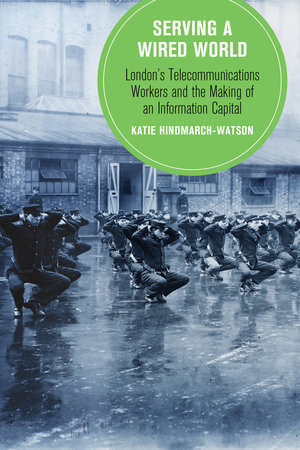By Katie Hindmarch-Watson, author of Serving a Wired World: London’s Telecommunications Workers and the Making of an Information Capital
When I first began working on my new book, Serving a Wired World, I thought I would be writing a reappraisal of a late-Victorian sex scandal. But as I learned more about the working lives of the first mass generation of telecommunications workers, I ended up with something entirely different: a reflection on labor in a particular information economy. The labor and issues in this economy have strong parallels to the present, especially as a the global covid-19 pandemic has revealed and reorganized work regimes.
The telecommunications workers I profile in Serving a Wired World were responsible for mediating the private communications of an elite, demanding public. The access telegraphists, telephone operators, and telegraph messenger boys had to the information of others was both necessary for the systems to work and troubling to its users. They were communications service workers catering to consumers obsessed with privacy. This meant that their invisibility, not their abilities, was paramount to their social value. They were caught in a vicious cycle: the more they asserted their individual professionalism, the more their respectability (and wages) were undermined.
When I started working on the book, I had an eye towards our present information consumption obsessions, those who work behind-the-scenes to make social media-dependent lives possible, and our ongoing concerns with individual privacy in a neoliberal order. It’s a strange coincidence that this book came out when it did, in the middle of a year which has re-aligned work regimes around the latest communication technologies and has exposed the kinds of in person labor still necessary for the maintenance and flow of goods, money, people, and information. In the United States we can now talk about the “zoom class” and how its functioning during the pandemic is largely made possible by the “gig class.” The precarity of service work has been magnified, as have the trade-offs we make between communication, purchasing, and privacy. We now acknowledge “essential” labor, yet as in the nineteenth century much of this is meant to be as invisible as possible. And it is highly undervalued.
Perhaps it’s not a coincidence that this past year has also seen the beginnings of collective action among the many thousands of IT workers who make our Big Tech-run world – and its profits – possible. We are subject to a very different information economy than the Victorians were, but our era of mass online intimacy bears traces of that older order. Information capital, like the capital generated by many other service occupations, still flows towards consumers, at the expense of most producers.
